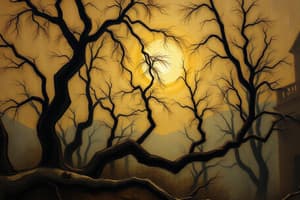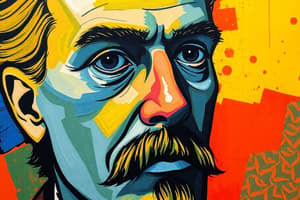Podcast
Questions and Answers
What does Bascom's definition of myth primarily reflect?
What does Bascom's definition of myth primarily reflect?
- Historical accuracy
- Essentialist bias (correct)
- Cross-cultural universals
- Cultural tendencies
All myth-producing cultures share many common traits.
All myth-producing cultures share many common traits.
False (B)
What term did Ludwig Wittgenstein use to describe the relationship between different members of a category?
What term did Ludwig Wittgenstein use to describe the relationship between different members of a category?
Family resemblances
Myth might be more usefully defined as a narrative which is considered socially ______, and is told in such a way as to allow the entire social collective to share a sense of this importance; legend is less ______ or ______ for only part of that society; folktale is even less ______.
Myth might be more usefully defined as a narrative which is considered socially ______, and is told in such a way as to allow the entire social collective to share a sense of this importance; legend is less ______ or ______ for only part of that society; folktale is even less ______.
What is a potential issue with insisting that a myth must be a 'traditional tale'?
What is a potential issue with insisting that a myth must be a 'traditional tale'?
What does Bruce Lincoln define myth as?
What does Bruce Lincoln define myth as?
What underlying factor determines the distinctions between types of tales according to Bascom?
What underlying factor determines the distinctions between types of tales according to Bascom?
What is typically the final step in a process of empirical discovery according to the text?
What is typically the final step in a process of empirical discovery according to the text?
Which option describes a common weakness among definitions of myth?
Which option describes a common weakness among definitions of myth?
In the anecdote of the three blind men, what animal were they trying to define?
In the anecdote of the three blind men, what animal were they trying to define?
A folktale is considered as true by its narrator and audience.
A folktale is considered as true by its narrator and audience.
According to Bascom, myths are considered to be ______ accounts of what happened in the remote past.
According to Bascom, myths are considered to be ______ accounts of what happened in the remote past.
Which cultures did Bascom use to illustrate the distinction between myths and folktales?
Which cultures did Bascom use to illustrate the distinction between myths and folktales?
What aspect does Bascom highlight as important for classifying narratives?
What aspect does Bascom highlight as important for classifying narratives?
Bascom's definition of myth excludes written texts.
Bascom's definition of myth excludes written texts.
Match the following categories of narratives with their descriptions:
Match the following categories of narratives with their descriptions:
What does Bascom mean by 'prose narrative' in relation to myths?
What does Bascom mean by 'prose narrative' in relation to myths?
What warning do the Ashanti narrators typically provide when telling tales?
What warning do the Ashanti narrators typically provide when telling tales?
Flashcards are hidden until you start studying
Study Notes
Introduction to Myth
- Definition of myth is viewed as not necessarily innocent; it can reflect the biases and theories of the definer.
- Myth definitions often come at the end of theoretical processes, influencing acceptance without presenting full arguments or evidence.
- Comparison and ideological perspectives are central to understanding different definitions and interpretations of myth.
Cautionary Tales in Defining Myth
- Stith Thompson's blind men and the elephant anecdote illustrates selective definitions of myth.
- Myths are often categorized based on predetermined theories, leading to circular reasoning.
- Plato's definition of "Man" challenged by Diogenes highlights the peril of overly broad or narrow definitions.
Classifying Myths, Legends, and Folktales
- Three categories:
- Myths are sacred prose narratives seen as truthful accounts from the remote past.
- Legends are considered true by narrators but set in a more recent context.
- Folktales are viewed as fiction.
- All three involve oral traditions and may share narrative structures.
Characteristics and Functions of Myths
- Myths embody dogma, often sacred or related to theology and rituals.
- Main characters in myths include deities, animals, or culture heroes, differing from legends where characters are usually human.
- Myths explain origins of the world, humanity, and natural phenomena, often including divine or cultural narratives.
Critique of Definitions
- Bascom's definition is criticized for being too broad, relying on empirical observations and potentially distorted by cultural biases.
- Concerns about the focus on orality dismiss important written ancient mythologies like the Iliad or Epic of Gilgamesh.
- Historical context demonstrates that distinctions between myth, legend, and folktale originated within specific cultural frameworks, particularly Western.
Cultural Concepts and Relativity
- Myth interpretations vary widely across cultures, questioning the universality of definitions.
- Comparatists may impose their own cultural assumptions, risking oversimplification of non-Western mythologies.
- Total reliance on empirical criteria may overlook deeper cultural meanings and social contexts of narratives.
Challenges of Comparison
- The method assumes myth-producing cultures share simple, undifferentiated characteristics, which might not hold true.
- Definitions of myth are subject to biases of the comparatist's background, limiting objectivity.
- Essentialist definitions based on presumed shared traits may inadequately capture the complexity of mythological narratives.
Conclusion on Myth Definitions
- Attempts to rigidly define "myth" encounters problems understanding cultural categories and using formal criteria.
- Recognizing the fluidity of concepts is essential for meaningful engagement with myths across varied cultural landscapes.### Wittgenstein's Theory of Family Resemblances
- Concept illustrates difficulties in defining categories like "games" through a shared commonality.
- Defines "family resemblances" as overlapping similarities among members of a category.
- Activities labeled "games" due to their resemblance to existing games; categorization involves cultural arbitrariness.
Genre Classification in Literature
- Genre categories: myth, legend, folktale, assessed by cultural significance rather than fixed criteria.
- Essentialist definitions are problematic; cross-cultural patterns in narrative genres may exist, but universals are elusive.
- Cultural products can have distinct classifications that vary by cultural lens.
Bascom's Contributions to Genre Study
- Bascom's study emphasizes observer biases in defining narrative categories.
- Classification criteria focus on reception, filtering out subjective essentialism.
- Importance ascribed to stories influences classification: myths viewed as socially important narratives.
Distinctions Between Myth, Legend, and Folktale
- Myth defined as a narrative of socially significant importance, shared collectively.
- Legend holds lesser importance, potentially only relevant to parts of society; folktales are even less significant.
- Placement of stories within these categories is fluid and varies across cultures.
Social Importance and Truth Criteria
- Social importance of stories illustrated by the gradation of character types: gods, heroes, ordinary men, and animals.
- More significant stories often come with greater ceremonial presentation and prohibitions.
- Truth defines stories' social importance rather than their factual accuracy; frequent allusion in social discourse indicates importance.
Contemporary Relevance of Myths and Legends
- Modern definitions often incorrectly limit myths and legends to traditional tales, disregarding current events and figures.
- "Legends in their own time" highlights how contemporary narratives can gain legendary status.
- Myths serve as a function of social ideology, relevant across varying contexts and time periods.
Studying That Suits You
Use AI to generate personalized quizzes and flashcards to suit your learning preferences.




